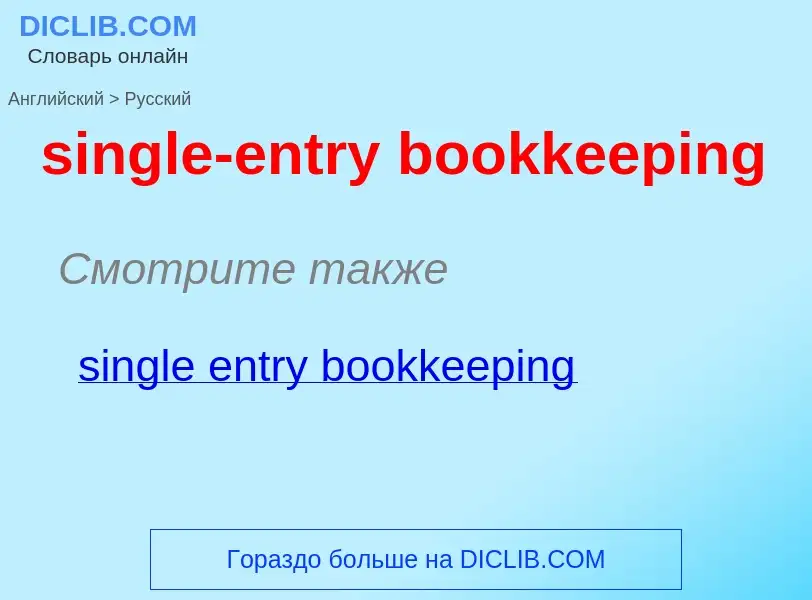Перевод и анализ слов искусственным интеллектом ChatGPT
На этой странице Вы можете получить подробный анализ слова или словосочетания, произведенный с помощью лучшей на сегодняшний день технологии искусственного интеллекта:
- как употребляется слово
- частота употребления
- используется оно чаще в устной или письменной речи
- варианты перевода слова
- примеры употребления (несколько фраз с переводом)
- этимология
single-entry bookkeeping - перевод на Английский
Смотрите также
[siŋg(ə)l'entri'bukki:piŋ]
бухгалтерский учет
система одинарной записи
простая бухгалтерия (принцип, согласно которому каждая операция отражается или по дебету или по кредиту бухгалтерского счета)
бухгалтерия
бухгалтерский учёт по системе одинарных записей
синоним
антоним
2) бухгалтерский учёт по методу двойной записи
Смотрите также
Смотрите также
бухгалтерский учет
система двойной записи (система учета, в соответствии с которой каждая операция отражается одновременно по дебету одного и кредиту другого бухгалтерского счета; считается более надежной по сравнению с простой бухгалтерией, т. к. позволяет проверять точность отражения операций)
синоним
антоним
Смотрите также
бухгалтерский учет
двойной аспект
правило двойственности (принцип, согласно которому каждый факт хозяйственной жизни дает основание для проведения как дебетовой, так и кредитовой записи на счетах бухгалтерского учета)
Определение
Википедия
Single-entry bookkeeping, also known as, single-entry accounting, is a method of bookkeeping that relies on a one-sided accounting entry to maintain financial information. The primary bookkeeping record in single-entry bookkeeping is the cash book, which is similar to a checking account register (in UK: cheque account, current account), except all entries are allocated among several categories of income and expense accounts. Separate account records are maintained for petty cash, accounts payable and receivable, and other relevant transactions such as inventory and travel expenses. To save time and avoid the errors of manual calculations, single-entry bookkeeping can be done today with do-it-yourself bookkeeping software.
Double entry accounting often requires commitment which most sole proprietors cannot afford to do or simply not interested in it. Among these types of businesses it is common for them to only keep records of bill payments and cash they received during the course of the business. Nonetheless, there is some level of record keeping as these businesses are keeping track of income and expenditure of the business. As such, the practice of keeping partial records of business related transactions which is outside the requirements of double entry book keeping is called “single entry accounting” / “Accounting for incomplete records”.
Most businesses maintain a record of transactions using double-entry bookkeeping. However, many smaller businesses use single-entry books that record the "bare essentials." In some cases, only records of cash, accounts receivable, accounts payable and taxes paid may be maintained.
This type of accounting with additional information can typically be compiled into an income statement and statement of affairs by a professional accountant.

![''Della mercatura e del mercante perfetto'' by [[Benedetto Cotrugli]], cover of 1602 edition; originally written in 1458 ''Della mercatura e del mercante perfetto'' by [[Benedetto Cotrugli]], cover of 1602 edition; originally written in 1458](https://commons.wikimedia.org/wiki/Special:FilePath/Cotrugli - Della mercatura, 1602 - 122.jpg?width=200)
